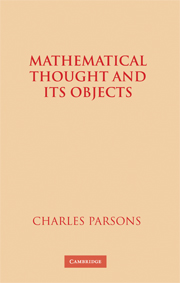8 - Mathematical induction
Published online by Cambridge University Press: 24 November 2009
Summary
Induction and the concept of natural number
Writers on the foundations of arithmetic have found it difficult to state in a convincing way why the principle of mathematical induction is evident. We have presented in earlier chapters different formulations of the principle, as a second-order statement with different interpretations in §§10–11 and as a rule in §31. What we have in view continues to be induction on natural numbers; however, the discussion applies to any structure whose domain consists of the objects obtained from an initial one by iterating a unary operation.
A classic view on the question, first developed by Frege and Dedekind and adopted by Whitehead and Russell in Principia Mathematica, is that induction is a consequence of a definition of ‘natural number’. The comprehension principle of second-order logic implies that, if we define a simply infinite system or progression as in §11, then induction holds in every simply infinite system. The matter can be presented a little more simply. Suppose we have 0 and S, in the context of classical logic so that the existence of 0 and the defined character of S are presupposed. Then we can define
Na ↔ (∀F){[F 0 ∧ (∀x) (Fx → F (Sx))] → Fa},
and induction in the form
(2) {A(0) ∧ (∀x)[Nx → (A(x) → A(Sx))]} → (∀x)(Nx → A(x))
follows easily.
According to this proposal, induction falls out of an explanation of the meaning of the term ‘natural number’.
Information
- Type
- Chapter
- Information
- Mathematical Thought and its Objects , pp. 264 - 315Publisher: Cambridge University PressPrint publication year: 2007
